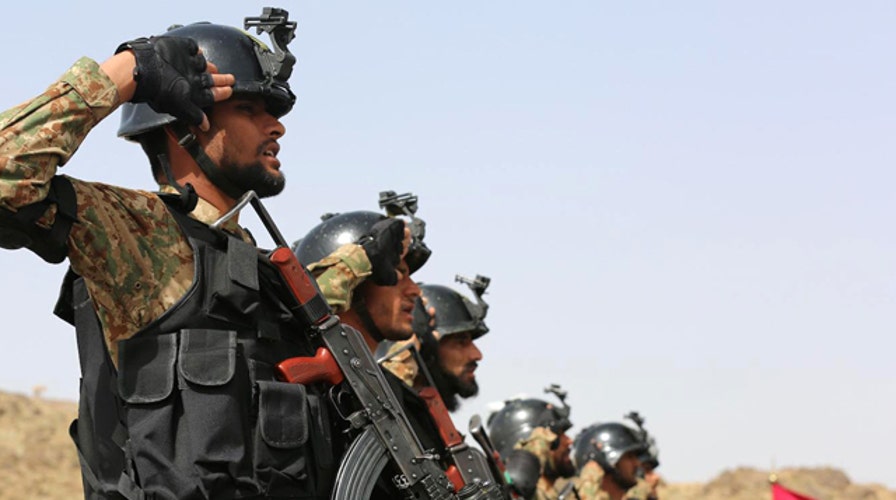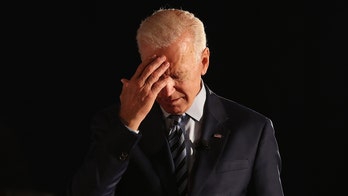US to speed up weapons delivery to Saudi coalition in Yemen
Defense Secretary Carter warns Al Qaeda using Yemen chaos to expand influence
Intervention by the U.S. and Iran in Yemen is raising the prospect of a proxy war even as the Obama administration tries to reach a nuclear deal with the Islamic Republic – with Iran sending two ships to waters near Yemen, as the U.S. speeds up military aid to the Saudi-led coalition striking Tehran-backed rebels there.
Iran's English-language state broadcaster Press TV quoted Rear Adm. Habibollah Sayyari as saying the ships, dispatched for the Gulf of Aden, would be part of an anti-piracy campaign "safeguarding naval routes for vessels in the region."
But the move comes amid the Saudi-led air campaign against Yemeni rebels, known as Houthis, which Iran is accused of backing.
While the Pentagon has not yet weighed in on the ship movements, spokesman Col. Steve Warren said Wednesday: “We know that Iranians are providing support to the Houthis.”
The developments underscore the growing international tensions surrounding the chaotic fighting in Yemen, with the U.S. shoring up Saudi-led forces on one side and Iran allegedly backing the Houthis on the other – though Iran and the rebels deny any direct military assistance.
The fighting and international involvement threaten to hang over ongoing nuclear talks, which yielded a deal framework last week in Switzerland. The U.S., Iran and five other world powers are trying to strike a final deal by June – though critics have pointed to Iran’s involvement in Yemen and elsewhere as a serious cause for concern.
But administration officials argue a nuclear deal is still worth pursuing, claiming it would cut off pathways to a nuclear bomb for the regime and make the world safer. State Department spokeswoman Marie Harf said Wednesday that “of course” the U.S. would like Iran to stop supporting the Yemen rebels and Hezbollah and other groups.
“In a perfect world, of course we would have an agreement that does all of these things, but we are living in the real world,” she said, adding they want to get “this one issue dealt with.”
Warren said Wednesday he could not say whether “Iranian money or equipment” has been delivered to the Houthis, but “we know the Iranians are partnered with the Houthis and they are working together.”
Speaking a day earlier in the Saudi capital, Riyadh, U.S. Deputy Secretary of State Antony Blinken blamed the violence in Yemen on the Houthis, and forces loyal to former President Ali Abdullah Saleh, saying that the U.S. is committed to defending Saudi Arabia.
"We have expedited weapons deliveries, we have increased our intelligence sharing, and we have established a joint coordination and planning cell in the Saudi operations center," he said in a statement to reporters after meeting with Saudi royals and Yemen's President Abed Rabbo Mansour Hadi, who fled his country amid rebel advances.
Warren said Wednesday that no additional munitions have been delivered yet. He would not specify the types of bombs involved.
Meanwhile, the intelligence sharing includes making available raw aerial imagery the coalition could use to better strike anti-Hadi forces, a U.S. defense official said. Blinken said the U.S. and the six-nation Gulf Cooperation Council must coordinate closely and press all parties to seek a political solution.
The Gulf Arab-backed air campaign supporting Hadi, which began on March 26, has so far failed to stop the Houthis' advance on Aden, Yemen's second-largest city, which was declared the provisional capital by Hadi before he fled.
The U.S. also says that the chaos has allowed the local Al Qaeda branch, which it considers the world's most dangerous wing of the group, to make "great gains" on the ground, causing Washington to rethink how it prevents it from launching attacks in the West.
Speaking from Tokyo, Defense Secretary Ash Carter said the collapse of the central government in Yemen makes it harder to conduct counterterrorism operations against Al Qaeda, which has ambitions to strike Western targets, including the United States. Regarding the weapons deliveries, he said it involved "some resupply of equipment and munitions" to Saudi Arabia.
The World Health Organization warned Tuesday of an unfolding humanitarian crisis, saying at least 560 people, including dozens of children, have been killed, mostly in the air campaign and ground battles. The aid group said that over 1,700 people have been wounded and another 100,000 have fled their homes as fighting has intensified over the past three weeks.
Fox News’ Lucas Tomlinson and The Associated Press contributed to this report.





